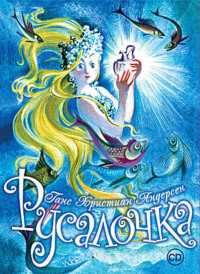 полная версия
полная версияPictures of Sweden

H. C. Andersen
Pictures of Sweden
INTRODUCTION
We TravelIt is a delightful spring: the birds warble, but you do not understand their song? Well, hear it in a free translation.
"Get on my back," says the stork, our green island's sacred bird, "and I will carry thee over the Sound. Sweden also has fresh and fragrant beech woods, green meadows and corn-fields. In Scania, with the flowering apple-trees behind the peasant's house, you will think that you are still in Denmark."
"Fly with me," says the swallow; "I fly over Holland's mountain ridge, where the beech-trees cease to grow; I fly further towards the north than the stork. You shall see the vegetable mould pass over into rocky ground; see snug, neat towns, old churches and mansions, where all is good and comfortable, where the family stand in a circle around the table and say grace at meals, where the least of the children says a prayer, and, morning and evening, sings a psalm. I have heard it, I have seen it, when little, from my nest under the eaves."
"Come with me! come with me!" screams the restless sea-gull, and flies in an expecting circle. "Come with me to the Skjärgaards, where rocky isles by thousands, with fir and pine, lie like flower-beds along the coast; where the fishermen draw the well-filled nets!"
"Rest thee between our extended wings," sing the wild swans. "Let us bear thee up to the great lakes, the perpetually roaring elvs (rivers), that rush on with arrowy swiftness; where the oak forest has long ceased, and the birch-tree becomes stunted. Rest thee between our extended wings: we fly up to Sulitelma, the island's eye, as the mountain is called; we fly from the vernal green valley, up over the snow-drifts, to the mountain's top, whence thou canst see the North Sea, on yonder side of Norway.
"We fly to Jemteland, where the rocky mountains are high and blue; where the Foss roars and rushes; where the torches are lighted as budstikke1 to announce that the ferryman is expected. Up to the deep, cold-running waters, where the midsummer sun does not set; where the rosy hue of eve is that of morn."
That is the birds' song. Shall we lay it to heart? Shall we accompany them?—at least a part of the way. We will not sit upon the stork's back, or between the swans' wings. We will go forward with steam, and with horses—yes, also on our own legs, and glance now and then from reality, over the fence into the region of thought, which is always our near neighbour-land; pluck a flower or a leaf, to be placed in the note-book—for it sprung out during our journey's flight: we fly and we sing. Sweden, thou glorious land! Sweden, where, in ancient times, the sacred gods came from Asia's mountains! land that still retains rays of their lustre, which streams from the flowers in the name of "Linnaeus;" which beams for thy chivalrous men from Charles the Twelfth's banner; which sounds from the obelisk on the field of Lutzen! Sweden, thou land of deep feeling, of heart-felt songs! home of the limpid elvs, where the wild swans sing in the gleam of the Northern Lights! Thou land, on whose deep, still lakes Scandinavia's fairy builds her colonnades, and leads her battling, shadowy host over the icy mirror! Glorious Sweden! with thy fragrant Linnaeus, with Jenny's soul-enlivening songs! To thee will we fly with the stork and the swallow, with the restless sea-gull and the wild swans. Thy birch-woods exhale refreshing fragrance under their sober, bending branches; on the tree's white stem the harp shall hang: the North's summer wind shall whistle therein!
TROLLHÄTTA
Who did we meet at Trollhätta? It is a strange story, and we will relate it.
We landed at the first sluice, and stood as it were in a garden laid out in the English style. The broad walks are covered with gravel, and rise in short terraces between the sunlit greensward: it is charming, delightful here, but by no means imposing. If one desires to be excited in this manner, one must go a little higher up to the older sluices, which deep and narrow have burst through the hard rock. It looks magnificent, and the water in its dark bed far below is lashed into foam. Up here one overlooks both elv and valley; the bank of the river on the other side, rises in green undulating hills, grouped with leafy trees and red-painted wooden houses, which are bounded by rocks and pine forests. Steam-boats and sailing vessels ascend through the sluices; the water itself is the attendant spirit that must bear them up above the rock, and from the forest itself it buzzes, roars and rattles. The din of Trollhätta Falls mingles with the noise from the saw-mills and smithies.
"In three hours we shall be through the sluices," said the Captain: "in that time you will see the Falls. We shall meet again at the inn up here."
We went from the path through the forest: a whole flock of bare-headed boys surrounded us. They would all be our guides; the one screamed longer than the other, and every one gave his contradictory explanation, how high the water stood, and how high it did not stand, or could stand. There was also a great difference of opinion amongst the learned.
We soon stopped on a ling-covered rock, a dizzying terrace. Before us, but far below, was the roaring water, the Hell Fall, and over this again, fall after fall, the rich, rapid, rushing elv—the outlet of the largest lake in Sweden. What a sight! what a foaming and roaring, above—below! It is like the waves of the sea, but of effervescing champagne—of boiling milk. The water rushes round two rocky islands at the top so that the spray rises like meadow dew. Below, the water is more compressed, then hurries down again, shoots forward and returns in circles like smooth water, and then rolls darting its long sea-like fall into the Hell Fall. What a tempest rages in the deep—what a sight! Words cannot express it!
Nor could our screaming little guides. They stood mute; and when they again began with their explanations and stories, they did not come far, for an old gentleman whom none of us had noticed (but he was now amongst us), made himself heard above the noise, with his singularly sounding voice. He knew all the particulars about the place, and about former days, as if they had been of yesterday.
"Here, on the rocky holms," said he, "it was that the warriors in the heathen times, as they are called, decided their disputes. The warrior Stärkodder dwelt in this district, and liked the pretty girl Ogn right well; but she was fonder of Hergrimmer, and therefore he was challenged by Stärkodder to combat here by the falls, and met his death; but Ogn sprung towards them, took her bridegroom's bloody sword, and thrust it into her own heart. Thus Stärkodder did not gain her. Then there passed a hundred years, and again a hundred years: the forests were then thick and closely grown; wolves and bears prowled here summer and winter; the place was infested with malignant robbers, whose hiding-place no one could find. It was yonder, by the fall before Top Island, on the Norwegian side—there was their cave: now it has fallen in! The cliff there overhangs it!"
"Yes, the Tailor's Cliff!" shouted all the boys. "It fell in the year 1755!"
"Fell!" said the old man, as if in astonishment that any one but himself could know it. "Everything will fall once, and the tailor directly." The robbers had placed him upon the cliff and demanded that if he would be liberated from them, his ransom should be that he should sew a suit of clothes up there; and he tried it; but at the first stitch, as he drew the thread out, he became giddy and fell down into the gushing water, and thus the rock got the name of 'The Tailor's Cliff.' One day the robbers caught a young girl, and she betrayed them, for she kindled a fire in the cavern. The smoke was seen, the caverns discovered, and the robbers imprisoned and executed. That outside there is called 'The Thieves' Fall,' and down there under the water is another cave, the elv rushes in there and returns boiling; one can see it well up here, one hears it too, but it can be heard better under the bergman's loft.
And we went on and on, along the Fall, towards Top Island, continuously on smooth paths covered with saw-dust, to Polham's Sluice. A cleft had been made in the rock for the first intended sluice-work, which was not finished, but whereby art has created the most imposing of all Trollhätta's Falls; the hurrying water falling here perpendicularly into the black deep. The side of the rock is here placed in connection with Top Island by means of a light iron bridge, which appears as if thrown over the abyss. We venture on to the rocking bridge over the streaming, whirling water, and then stand on the little cliff island, between firs and pines, that shoot forth from the crevices. Before us darts a sea of waves, which are broken by the rebound against the stone block where we stand, bathing us with the fine spray. The torrent flows on each side, as if shot out from a gigantic cannon, fall after fall: we look out over them all, and are filled with the harmonic sound, which since time began, has ever been the same.
"No one can ever get to the island there," said one of our party, pointing to the large island above the topmost fall.
"I however know one!" said the old man, and nodded with a peculiar smile.
"Yes, my grandfather could!" said one of the boys, "scarcely any one besides has crossed during a hundred years. The cross that is set up over there was placed there by my grandfather. It had been a severe winter, the whole of Lake Venern was frozen; the ice dammed up the outlet, and for many hours there was a dry bottom. Grandfather has told about it: he went over with two others, placed the cross up, and returned. But then there was such a thundering and cracking noise, just as if it were cannons. The ice broke up and the elv came over the fields and forest. It is true, every word I say!"
One of the travellers cited Tegner:
"Vildt Göta stortade från Fjallen,Hemsk Trollet från sat Toppfall röt!Men Snillet kom och sprängt stod Hallen,Med Skeppen i sitt sköt!""Poor mountain sprite," he continued, "thy power and glory recede! Man flies over thee—thou mayst go and learn of him."
The garrulous old man made a grimace, and muttered something to himself—but we were just by the bridge before the inn. The steam-boat glided through the opened way, every one hastened to get on board, and it directly shot away above the Fall, just as if no Fall existed.
"And that can be done!" said the old man. He knew nothing at all about steam-boats, had never before that day seen such a thing, and accordingly he was sometimes up and sometimes down, and stood by the machinery and stared at the whole construction, as if he were counting all the pins and screws. The course of the canal appeared to him to be something quite new; the plan of it and the guide-books were quite foreign objects to him: he turned them and turned them—for read I do not think he could. But he knew all the particulars about the country—that is to say, from olden times.
I heard that he did not sleep at all the whole night. He studied the passage of the steam-boat; and when we in the morning ascended the sluice terraces from Lake Venern, higher and higher from lake to lake, away over the high-plain—higher, continually higher—he was in such activity that it appeared as if it could not be greater—and then we reached Motala.
The Swedish author Tjörnerös relates of himself, that when a child he once asked what it was that ticked in the clock, and they answered him that it was one named "Bloodless." What brought the child's pulse to beat with feverish throbs and the hair on his head to rise, also exercised its power in Motala, over the old man from Trollhätta.
We now went through the great manufactory in Motala. What ticks in the clock, beats here with strong strokes of the hammer. It is Bloodless, who drank life from human thought and thereby got limbs of metals, stone and wood; it is Bloodless, who by human thought gained strength, which man himself does not physically possess. Bloodless reigns in Motala, and through the large foundries and factories he extends his hard limbs, whose joints and parts consist of wheel within wheel, chains, bars, and thick iron wires. Enter, and see how the glowing iron masses are formed into long bars. Bloodless spins the glowing bar! see how the shears cut into the heavy metal plates; they cut as quietly and as softly as if the plates were paper. Here where he hammers, the sparks fly from the anvil. See how he breaks the thick iron bars; he breaks them into lengths; it is as if it were a stick of sealing-wax that is broken. The long iron bars rattle before your feet; iron plates are planed into shavings; before you rolls the large wheel, and above your head runs living wire—long heavy wire! There is a hammering and buzzing, and if you look around in the large open yard, amongst great up-turned copper boilers, for steam-boats and locomotives, Bloodless also here stretches out one of his fathom-long fingers, and hauls away. Everything is living; man alone stands and is silenced by—stop!
The perspiration oozes out of one's fingers'-ends: one turns and turns, bows, and knows not one's self, from pure respect for the human thought which here has iron limbs. And yet the large iron hammer goes on continually with its heavy strokes: it is as if it said: "Banco, Banco! many thousand dollars; Banco, pure gain! Banco! Banco!"—Hear it, as I heard it; see, as I saw!
The old gentleman from Trollhätta walked up and down in full contemplation; bent and swung himself about; crept on his knees, and stuck his head into corners and between the machines, for he would know everything so exactly; he would see the screw in the propelling vessels, understand their mechanism and effect under water—and the water itself poured like hail-drops down his forehead. He fell unconscious, backwards into my arms, or else he would have been drawn into the machinery, and been crushed: he looked at me, and pressed my hand.
"And all this goes on naturally," said he; "simply and comprehensibly. Ships go against the wind, and against the stream, sail higher than forests and mountains. The water must raise, steam must drive them!"
"Yes," said I.
"Yes," said he, and again yes, with a sigh which I did not then understand; but, months after, I understood it, and I will at once make a spring to that time, and we are again at Trollhätta.
I came here in the autumn, on my return home; stayed some days in this mighty piece of nature, where busy human life forces its way more and more in, and, by degrees, transforms the picturesque to the useful manufactory. Trollhätta must do her work; saw beams, drive mills, hammer and break to pieces: one building grows up by the side of the other, and in half a century hence here will be a city. But that was not the story.
I came, as I have said, here again in the autumn. I found the same rushing and roaring, the same din, the same rising and sinking in the sluices, the same chattering boys who conducted fresh travellers to the Hell Fall, to the iron-bridge island, and to the inn. I sat here, and turned over the leaves of books, collected here through a series of years, in which travellers have inscribed their names, feelings and thoughts at Trollhätta—almost always the same astonishment, expressed in different languages, though generally in Latin: veni, vidi, obstupui.
One has written: "I have seen nature's master-piece pervade that of art;" another cannot say what he saw, and what he saw he cannot say. A mine owner and manufacturer, full of the doctrine of utility, has written: "Seen with the greatest pleasure this useful work for us in Värmeland, Trollhätta." The wife of a dean from Scania expresses herself thus. She has kept to the family, and only signed in the remembrance book, as to the effect of her feelings at Trollhätta. "God grant my brother-in-law fortune, for he has understanding!" Some few have added witticisms to the others' feelings; yet as a pearl on this heap of writing shines Tegner's poem, written by himself in the book on the 28th of June, 1804:
"Gotha kom i dans från Seves fjallar, &c."I looked up from the book and who should stand before me, just about to depart again, but the old man from Trollhätta! Whilst I had wandered about, right up to the shores of Siljan, he had continually made voyages on the canal; seen the sluices and manufactories, studied steam in all its possible powers of service, and spoke about a projected railway in Sweden, between the Hjalmar and Venern. He had, however, never yet seen a railway, and I described to him these extended roads, which sometimes rise like ramparts, sometimes like towering bridges, and at times like halls of miles in length, cut through rocks. I also spoke of America and England.
"One takes breakfast in London, and the same day one drinks tea in Edinburgh."
"That I can do!" said the man, and in as cool a tone as if no one but himself could do it, "I can also," said I; "and I have done it."
"And who are you, then?" he asked.
"A common traveller," I replied; "a traveller who pays for his conveyance. And who are you?"
The man sighed.
"You do not know me: my time is past; my power is nothing! Bloodless is stronger than I!" and he was gone.
I then understood who he was. Well, in what humour must a poor mountain sprite be, who only comes up every hundred years to see how things go forward here on the earth!
It was the mountain sprite and no other, for in our time every intelligent person is considerably wiser; and I looked with a sort of proud feeling on the present generation, on the gushing, rushing, whirling wheel, the heavy blows of the hammer, the shears that cut so softly through the metal plates, the thick iron bars that were broken like sticks of sealing-wax, and the music to which the heart's pulsations vibrate: "Banco, Banco, a hundred thousand Banco!" and all by steam—by mind and spirit.
It was evening. I stood on the heights of Trollhätta's old sluices, and saw the ships with outspread sails glide away through the meadows like spectres, large and white. The sluice gates were opened with a ponderous and crashing sound, like that related of the copper gates of the secret council in Germany. The evening was so still that Trollhätta's Fall was as audible in the deep stillness, as if it were a chorus from a hundred water-mills—ever one and the same tone. In one, however, there sounded a mightier crash that seemed to pass sheer through the earth; and yet with all this the endless silence of nature was felt. Suddenly a large bird flew out from the trees, far in the forest, down towards the Falls. Was it the mountain sprite?—We will imagine so, for it is the most interesting fancy.
THE BIRD PHOENIX
In the garden of Paradise, under the tree of knowledge, stood a hedge of roses. In the first rose a bird was hatched; its flight was like that of light, its colours beautiful, its song magnificent.
But when Eve plucked the fruit of knowledge, when she and Adam were driven from the garden of Paradise, a spark from the avenging angel's flaming sword fell into the bird's nest and kindled it. The bird died in the flames, but from the red egg there flew a new one—the only one—the ever only bird Phoenix. The legend states that it takes up its abode in Arabia; that every hundred years it burns itself up in its nest, and that a new Phoenix, the only one in the world, flies out from the red egg.
The bird hovers around us, rapid as the light, beautiful in colour, glorious in song. When the mother sits by the child's cradle, it is by the pillow, and with its wings flutters a glory around the child's head. It flies through the chamber of contentment, and there is the sun's radiance within:—the poor chest of drawers is odoriferous with violets.
But the bird Phoenix is not alone Arabia's bird: it flutters in the rays of the Northern Lights on Lapland's icy plains; it hops amongst the yellow flowers in Greenland's short summer. Under Fahlun's copper rocks, in England's coal mines, it flies like a powdered moth over the hymn-book in the pious workman's hands. It sails on the lotus-leaf down the sacred waters of the Ganges, and the eyes of the Hindoo girl glisten on seeing it.
The bird Phoenix! Dost thou not know it? The bird of Paradise, song's sacred swan! It sat on the car of Thespis, like a croaking raven, and flapped its black, dregs-besmeared wings; over Iceland's minstrel-harp glided the swan's red, sounding bill. It sat on Shakspeare's shoulder like Odin's raven, and whispered in his ear: "Immortality!" It flew at the minstrel competition, through Wartzburg's knightly halls.
The bird Phoenix! Dost thou not know it? It sang the Marseillaise for thee, and thou didst kiss the plume that fell from its wing: it came in the lustre of Paradise, and thou perhaps didst turn thyself away to some poor sparrow that sat with merest tinsel on its wings.
The bird of Paradise! regenerated every century, bred in flames, dead in flames; thy image set in gold hangs in the saloons of the rich, even though thou fliest often astray and alone. "The bird Phoenix in Arabia"—is but a legend.
In the garden of Paradise, when thou wast bred under the tree of knowledge, in the first rose, our Lord kissed thee and gave thee thy proper name—Poetry.
KINNAKULLA
Kinnakulla, Sweden's hanging gardens! Thee will we visit. We stand by the lowest terrace in a plenitude of flowers and verdure; the ancient village church leans its grey pointed wooden tower, as if it would fall; it produces an effect in the landscape: we would not even be without that large flock of birds, which just now chance to fly away over the mountain forest.
The high road leads up the mountain with short palings on either side, between which we see extensive plains with hops, wild roses, corn-fields, and delightful beech woods, such as are not to be found in any other place in Sweden. The ivy winds itself around old trees and stones—even to the withered trunk green leaves are lent. We look out over the flat, extended woody plain, to the sunlit church-tower of Maristad, which shines like a white sail on the dark green sea: we look out over the Venern Lake, but cannot see its further shore. Skjärgaardens' wood-crowned rocks lie like a wreath down in the lake; the steam-boat comes—see! down by the cliff under the red-roofed mansions, where the beech and walnut trees grow in the garden.
The travellers land; they wander under shady trees away over that pretty light green meadow, which is enwreathed by gardens and woods: no English park has a finer verdure than the meadows near Hellekis. They go up to "the grottos," as they call the projecting masses of red stone higher up, which, being thoroughly kneaded with petrifactions, project from the declivity of the earth, and remind one of the mouldering colossal tombs in the Campagna of Rome. Some are smooth and rounded off by the streaming of the water, others bear the moss of ages, grass and flowers, nay, even tall trees.
The travellers go from the forest road up to the top of Kinnakulla, where a stone is raised as the goal of their wanderings. The traveller reads in his guide-book about the rocky strata of Kinnakulla: "At the bottom is found sandstone, then alum-stone, then limestone, and above this red-stone, higher still slate, and lastly, trap." And, now that he has seen this, he descends again, and goes on board. He has seen Kinnakulla:—yes, the stony rock here, amidst the swelling verdure, showed him one heavy, thick stone finger, and most of the travellers think that they are like the devil, if they lay hold upon one finger, they have the body—but it is not always so. The least visited side of Kinnakulla is just the most characteristic, and thither will we go.
The road still leads us a long way on this side of the mountain, step by step downwards, in long terraces of rich fields: further down, the slate-stone peers forth in flat layers, a green moss upon it, and it looks like threadbare patches in the green velvet carpet. The high road leads over an extent of ground where the slate-stone lies like a firm floor. In the Campagna of Rome, one would say it is a piece of via appia, or antique road; but it is Kinnakulla's naked skin and bones that we pass over. The peasant's house is composed of large slate-stones, and the roof is covered with them; one sees nothing of wood except that of the door, and above it, of the large painted shield, which states to what regiment the soldier belongs who got this house and plot of ground in lieu of pay.









